Here we have another review stolen from Variety.
 |
| Sister Aloysius (Amy Ryan), Sister James (Zoe Kazan) and Father Flynn (Liev Schreiber) - Joan Marcus |
‘Doubt: A Parable’ Review: Liev Schreiber’s Performance Cuts Through a Somber and Confining Single Act By Aramide Tinubu
Unfortunately, no one makes it to adulthood without forming a series of preconceived notions. These points of view often determine how we judge certain people and observe various circumstances. John Patrick Shanley’s 2005 play “Doubt: A Parable,” set in 1964, opens with a sermon on doubt from the affable and modern-minded Father Flynn (Liev Schreiber). He speaks to his parishioners (the audience) about skepticism and how that can quickly transform into a crisis of faith, as one isolates oneself in a singular perspective. Charismatic and warm, the priest brings a different energy to St. Nicholas’ church and school, which has been a very formal center of learning run by the stern and unyielding principal, Sister Aloysius (Amy Ryan).
Father Flynn’s presence isn’t the only massive change the parish is experiencing. Twelve-year-old Donald has enrolled in the school, making him the sole Black student among the Italian and Irish pupils. (Interestingly, no children are actually showcased in the play.) Guided by a particular and antiquated view of education and the church hierarchy, Sister Aloysius is immediately unsettled by Father Flynn’s interest in Donald. After pulling some more information from a naive teacher, Sister James (Zoe Kazan), the principal begins crafting an unsubstantiated narrative centering on an inappropriate relationship between the priest and the young Black student.
Across the copious amounts of dialogue squeezed into a 90-minute run time, the audience races to examine everyone’s unique understanding of the matter. There is Sister James, who is too unsure of herself to form an opinion. Donald’s mother, Mrs. Muller (Quincy Tyler Bernstine), is solely focused on shielding her son from his father and getting him through the end of the school year to graduation, despite hearing Sister Aloysius’ concerns. Meanwhile, the principal is steadfast in her beliefs, while Father Flynn’s defensiveness of the situation can be read as sheer horror at the accusation or complete denial and guilt.
With just four characters, “Doubt” works best when it showcases what happens to controlled environments like churches when people no longer abide by archaic rules or standards of behavior. A small encounter between Father Flynn and a pupil early in the school year shifts Sister Aloysius’ perception of him, and immediately puts her on alert. Though she’s determined to get to the bottom of what’s happening with the priest and Donald, the principal’s desire to be right colors everything she sees around her. In contrast, while Father Flynn fancies himself a progressive, as soon as he’s questioned, he clings to the church’s sexist hierarchy as a means to protect himself.
Like the nuns, viewers waver between certainty and suspicion, so the production remains intriguing despite the wordy dialogue. Moreover, amid the heaviness of the subject matter, humorous quips focusing on dirty fingernails, Sister Aloysius’ previous marital status and reflections on squawking birds work to infuse some light into “Doubt.” The play also works because of its modern-day relevance. Though it’s set 60 years in the past, the horrors and rot at the center of the Catholic Church have since come to light publicly.
Amid David Rockwell’s beautifully built rotating set depicting the church’s windows, a garden and the principal’s office, what’s exceedingly interesting about “Doubt,” aside from Schreiber’s standout performance, has nothing to do with Sister Aloysius’ indication or righteousness or if Father Flynn is or isn’t a pedophile. Instead, the play highlights how easy it is for influential people to prey on the vulnerable and how the systems we revere are complicit in demonizing those with the most to lose, while shielding the powerful from harm and repercussions. Uncomfortable and thought-provoking, the themes of “Doubt” have never been more urgent. Yet, the moral lesson at the story’s center worked best in the 2008 film, when the performances and characters could stretch beyond the limits of one confining act.



No comments:
Post a Comment